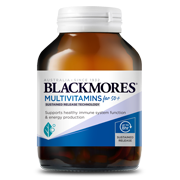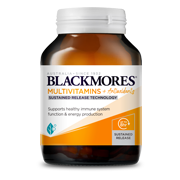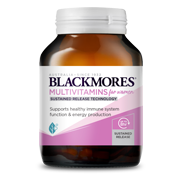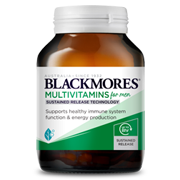Multivitamins
We also offer a sustained-release multi to gradually release key nutrients throughout the day.
Multivitamins
Blackmores Multivitamins for 50+
Blackmores® Multivitamins for 50+ with Sustained Release Technology is a tailormade blend of essential vitamins & minerals for people 50+.
Always read the label and follow the directions for use. Read the warnings below before purchase.
$36.99
This convenient one-a-day multivitamin supports eye and bone health and is designed with a unique sustained release technology that release nutrients to the body gradually throughout the day.
Thiamine nitrate (thiamine 1.2 mg) 1.5 mg
Riboflavin (vitamin B2) 1.6 mg
Nicotinamide 16 mg
Calcium pantothenate (pantothenic acid, vitamin B5 6 mg) 6.5 mg
Pyridoxine hydrochloride (pyridoxine vitamin B6 1.7 mg) 2.1 mg
Cyanocobalamin (vitamin B12) 2.4 micrograms
Ascorbic acid (vitamin C) 45 mg
Colecalciferol (vitamin D3 600 IU) 15 micrograms
d-alpha-tocopheryl acid succinate (vitamin E 14.9 IU) 12.3 mg
Biotin (vitamin H) 30 micrograms
Calcium carbonate (calcium 325 mg) 812.5 mg
Colloidal anhydrous silica 20 mg
Cupric sulfate phtahydrate (copper 600 micrograms) 2.4 mg
Phytomenadione (vitamin K1) 35 micrograms
Folic acid (vitamin B9) 200 micrograms
Heavy magnesium oxide (magnesium 105 mg) 183.8 mg
Ferrous fumarate (iron 5 mg) 15.7 mg
Zinc oxide (zinc 10 mg) 12.4 mg
Manganese sulfate monohydrate (manganese 3.5 mg) 10.8 mg
Chromic picolinate (chromium 35 micrograms) 282 micrograms
Potassium iodide (iodine 150 micrograms) 197 micrograms
Retinol acetate (vitamin A, 750 micrograms retinol equivalents) 884.3 micrograms
Selenomethionine (selenium 50 micrograms) 125 micrograms
Dosage
- Always read the label.
- Follow the directions for use.
- Warning: If you are pregnant or considering becoming pregnant do not take vitamin A supplements without consulting your doctor or pharmacist. When taken in excess of 3000 micrograms retinol equivalents - vitamin A can cause birth defects. The recommended daily amount of vitamin A from all sources is 700 micrograms retinol equivalents for women and 900 micrograms retinol equivalents for men.
- Dietary supplements can only be assistance if dietary intake is inadequate.
- If symptoms persist, talk to your health professional.
- This product contains selenium which is toxic in high doses. A daily dose of 150 micrograms for adults of selenium from dietary supplements should not be exceeded.
- If you have any pre-existing conditions or are on any medications always talk to your health professional before use.
- Some products should be ceased at least two weeks before any elective surgery, please confirm with your health professional.
- Contains soya bean products and sulfites.
Multivitamins
Blackmores Multivitamins + Antioxidants
Blackmores® Multivitamins + Antioxidants is a comprehensive multivitamin that supports immune system function and energy production with to …
Always read the label and follow the directions for use. Read the warnings below before purchase.
$54.00
Thiamine nitrate (thiamine, vitamin B1 1.2 mg) 1.5 mg
Riboflavin (vitamin B2) 1.3 mg
Nicotinamide 16 mg
Calcium pantothenate (pantothenic acid, vitamin B5 6 mg) 6.5 mg
Pyridoxine hydrochloride (pyridoxine, vitamin B6 1.7 mg) 2.1 mg
Cyanocobalamin (vitamin B12) 2.4 micrograms
Ascorbic acid (vitamin C) 100 mg
Colecalciferol (vitamin D 200 IU) 5 micrograms
d-alpha tocopheryl acid succinate (vitamin E 20 IU) 16.5 mg
Biotin (vitamin H) 30 micrograms
Folic acid (vitamin B9) 200 micrograms
Selenomethionine (selenium 65 micrograms) 163 micrograms
Magnesium phosphate pentahydrate (magnesium 42 mg) 203.3 mg
Zinc sulfate monohydrate (zinc 6 mg) 16.6 mg
Ferrous fumarate (iron 5 mg) 15.7 mg
Manganese sulfate monohydrate (manganese 1 mg) 3.1 mg
Cupric sulfate pentahydrate (copper 450 micrograms) 1.8 mg
Chromic chloride hexahydrate (chromium 100 micrograms) 523 mg
Calcium carbonate (calcium 110 mg) 275 mg
Potassium iodide (iodine 100 micrograms) 131 micrograms
Betacarotene 1.5 mg
Borax (boron 2 mg) 17.7 mg
Dosage
- Always read the label
- Follow the directions for use
- If symptoms persist, talk to your health professional
- WARNING: If you are pregnant or breastfeeding talk to your healthcare professional before use.
- This product contains selenium which is toxic in high doses. A daily dose of 150 microgram for adults of selenium from dietary supplements should not be exceeded. Dietary supplements can only be of assistance if dietary intake is inadequate.
- If you have any pre-existing conditions, or are on any medications always talk to your health professional before use
- Some products should be ceased at least two weeks before any elective surgery, please confirm with your health professional
- Contains soya bean products and sulfites
- WARNING - Stop taking this medication if you experience tingling, burning or numbness and see your healthcare practitioner as soon as possible. (Contains vitamin B6)
Multivitamins
Blackmores Multivitamins for Women
Sold Out
Blackmores® Multivitamins for Women with Sustained Release Technology is a tailormade blend of essential vitamins & minerals for women.
Always read the label and follow the directions for use. Read the warnings below before purchase.
$36.99
This convenient one-a-day multivitamin supports collagen formation and skin health and is designed with a unique sustained release technology that release nutrients to the body gradually throughout the day.
Betacarotene 1.2 mg
Thiamine nitrate (thiamine, vitamin B1, 1.1 mg) 1.4 mg
Riboflavin (vitamin b2) 1.1 mg
Nicotinamide 14 mg
Calcium pantothenate (pantothenic acid, vitamin B5 4 mg) 4.4 mg
Pyridoxine hydrochloride (pyridoxine, vitamin B6 1.3 mg) 1.6 mg
Cyanocobalamin (vitamin B12) 2.4 micrograms
Ascorbic acid (vitamin C) 45 mg
Colecalciferol (vitamin D3 200 IU) 5 micrograms
d-alpha tocopheryl acid succinate (vitamin E 10.4 IU) 8.6 mg
Biotin (vitamin H) 15 micrograms
Calcium hydrogen phosphate (calcium 100 mg) 339 mg
Choline bitartrate 145.8 mg
Folic acid ((vitamin B9) 400 micrograms
Heavy magnesium oxide (magnesium 80 mg) 140 mg
Ferrous fumarate (iron 5 mg) 15.7 mg
Phytomenadione (vitamin K1) 35 micrograms
Zinc amino acid chelate (zinc 8 mg) 40 mg
Manganese amino acid chelate (manganese 3.5 mg) 35 mg
Potassium iodide (iodine 150 micrograms) 197 micrograms
Cupric sulfate pentahydrate (copper 600 micrograms) 2.4 mg
Chromium picolinate (chromium 50 micrograms) 403 micrograms
Selenomethionine (selenium 60 micrograms) 150 micrograms
Eleutherococcus senticosus (Siberian ginseng) extract dry conc. 66.7 mg, equiv. dry root 1 g
Dosage
- Always read the label.
- Follow the directions for use.
- Do not use during pregnancy or breastfeeding.
- Dietary supplements can only be assistance if dietary intake is inadequate.
- If symptoms persist, talk to your health professional.
- This product contains selenium which is toxic in high doses. A daily dose of 150 micrograms for adults of selenium from dietary supplements should not be exceeded.
- If you have any pre-existing conditions or are on any medications always talk to your health professional before use.
- Some products should be ceased at least two weeks before any elective surgery, please confirm with your health professional.
- Contains soya bean products and sulfites.
Multivitamins
Blackmores Multivitamins for Men
Blackmores® Multivitamins for Men with Sustained Release Technology is a tailormade blend of essential vitamins & minerals for men.
Always read the label and follow the directions for use. Read the warnings below before purchase.
$36.99
This convenient one-a-day multivitamin supports testosterone levels and mental function and is designed with a unique sustained release technology that release nutrients to the body gradually throughout the day.
Retinyl acetate (vitamin A 900 micrograms retinol equivalents) 1.1 mg
Thiamine nitrate (thiamine, vitamin B1 1.2 mg) 1.5 mg
Riboflavin (vitamin B2) 1.3 mg
Nicotinamide 16 mg
Calcium pantothenate (pantothenic acid, vitamin B5 6 mg) 6.5 mg
Pyridoxine hydrochloride (pyridoxine, vitamin B6 1.3 mg) 1.6 mg
Cyanocobalamin (vitamin B12) 2.4 micrograms
Phytomenadione (vitamin K1) 35 micrograms
Ascorbic acid (vitamin C) 45 mg
d-alpha tocopheryl acid succinate (vitamin E 14.9 IU) 12.3 mg
Biotin (vitamin H) 30 micrograms
Folic acid (vitamin B9) 400 micrograms
Ferrous fumarate (iron 5 mg) 15.7 mg
Potassium iodide (iodine 150 micrograms) 197 micrograms
Lycopene 2 mg
Heavy magnesium oxide (magnesium 50 mg) 87.5 mg
Manganese sulfate monohydrate (manganese 3.5 mg) 10.8 mg
Zinc oxide (zinc 14 mg) 17.4 mg
Selenomethionine (selenium 70 micrograms) 175 micrograms
Cupric sulfate pentahydrate (copper 850 micrograms) 3.3 mg
Colecalciferol (vitamin D3 200 IU) 5 micrograms
Calcium carbonate (calcium 100 mg) 250 mg
Chromium picolinate (chromium 35 micrograms) 282 micrograms
Dosage
- Always read the label
- Follows the directions for use
- If symptoms persist, talk to your health professional
- WARNING: If you are pregnant, or considering becoming pregnant, do not take vitamin A supplements without consulting your doctor or pharmacist. When taken in excess of 3000 micrograms retinol equivalents, vitamin A can cause birth defects. The recommended daily amount of vitamin A from all sources is 700 micrograms retinol equivalents for women and 900 micrograms retinol equivalents for men
- Supplements can only be of assistance if dietary intake is inadequate
- This product contains selenium which is toxic in high doses. A daily dose of 150 micrograms for adults of selenium from dietary supplements should not be exceeded
- If you have any pre-existing conditions or are on any medications always talk to your health professional before use
- Some products should be ceased at least two weeks before any elective surgery, please confirm with your health professional
- Contains soya bean products and sulfites




